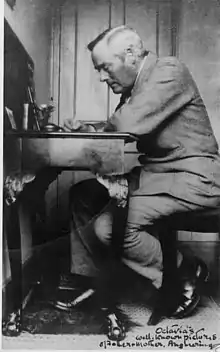Francis William Davenport
Francis William Davenport (9 April 1847, Wilderslowe, near Derby - 1 April, 1925, Scarborough) was an English musician and composer. In 1879 was appointed professor, at the Royal Academy of Music. Then in 1882 he became a professor at the Guildhall School of Music.[1]

Davenport read law at University College, Oxford. However, he decided to have a career in music, studying under George Alexander Macfarren. In 1873 he married Macfarren's daughter Clarina Thalia Macfarren (23 Mar 1848-10 Jul 1934). They had several children; son Robert, a writer and illustrator of children's stories and popular song lyricist, was father of the critic John Davenport[2][3]
Whilst teaching at the Royal Academy of Music, he taught harmony and counterpoint to Alicia Adélaide Needham, the mother of Joseph Needham.[4] Other pupils included Ethel Mary Boyce, Percy Buck, Arthur Hinton, Amy Elsie Horrocks, Chester Edward Ide, Colin McAlpin, Percy Hilder Miles and Ellen Riley Wright.
His daughter, originally Gertrude Mary Davenport married Eden Paul, with whom she published many works under the name Cedar Paul.[5] His nephew, Christopher Wilson, was a composer, conductor and music director for the theatre.[6]
Works
- Symphony in D minor: this won the Crystal Palace Symphony Competition in 1876.[7]
- Symphony No 2 in C major.
- Twelfth Night, overture for orchestra
- Prelude and Fugue for orchestra
- Piano Trio
- Six Pieces for piano and cello
- Pictures on a Journey, suite for piano
- Many partsongs and songs
Publications
- Elements of Music (1884)
- Elements of Harmony and Counterpoint (1886)
- Guide for Pianoforte Students (with Percy Baker) (1891)
References
- "Davenport, Francis William". www.encyclopedia.com. Encyclopedia.com. Retrieved 16 February 2021.
- The New Review, vol. 3, issue 31, 1976, pg 69
- A Dictionary of Music and Musicians (A.D. 1450–1880), George Grove, Macmillan, 1889, pg 608
- A. A. Needham: A Daughter of Music, archived in Cambridge among the "Joseph Needham Papers"
- Carey, Mike (2019). "Cedar and Eden Paul's Creative Revolution: The 'new psychology' and the dictatorship of the proletariat, 1917-1926". Twentieth Century Communism. Lawrence and Wishart. 17 (17): 122–165. doi:10.3898/175864319827751349. S2CID 214124194.
- Unsung Composers
- Foreman, Lewis. "Holes Held Together By String". www.musicweb-international.com. William Alwyn Society. Retrieved 16 February 2021.